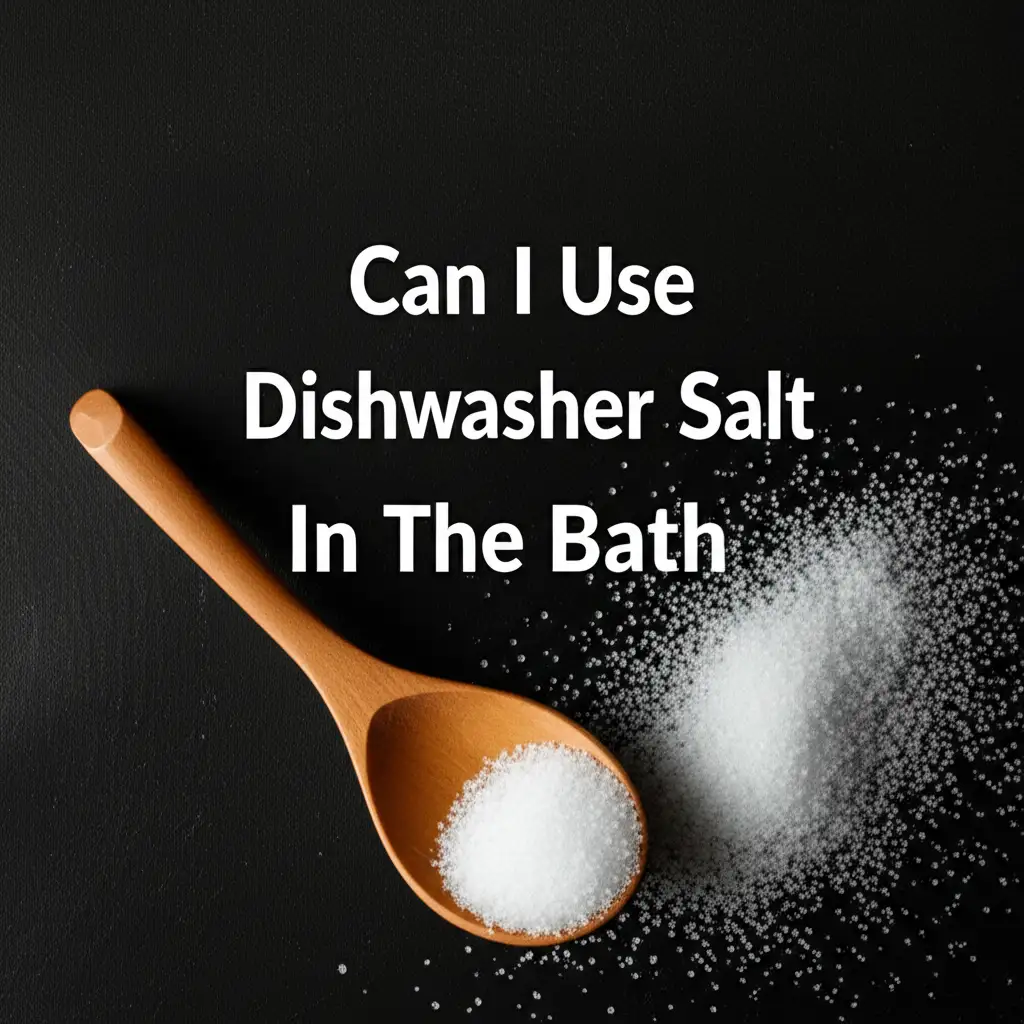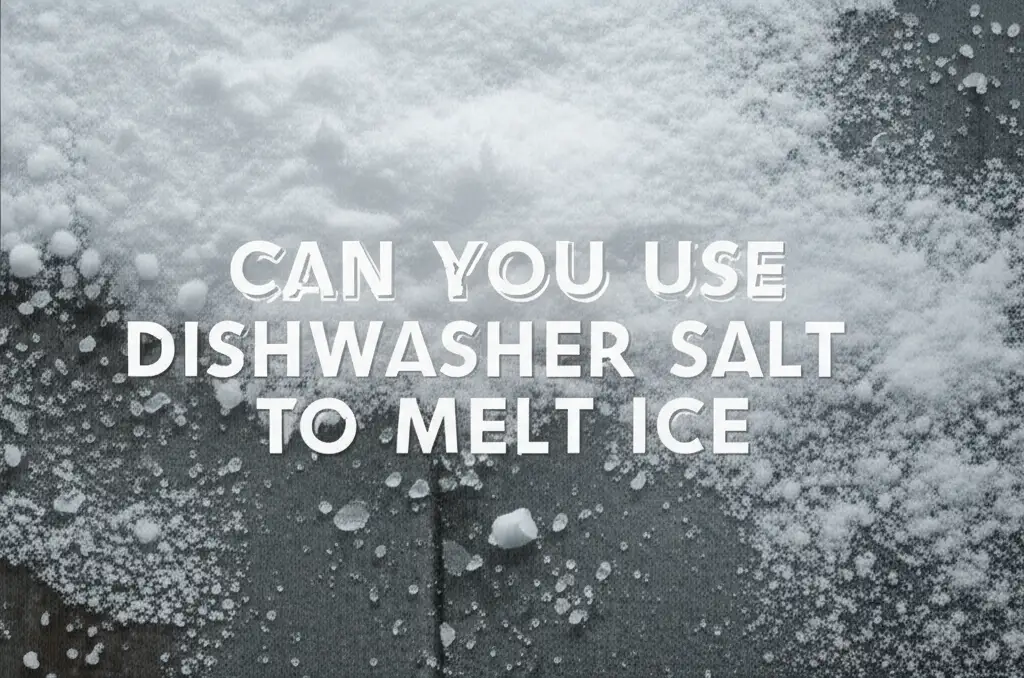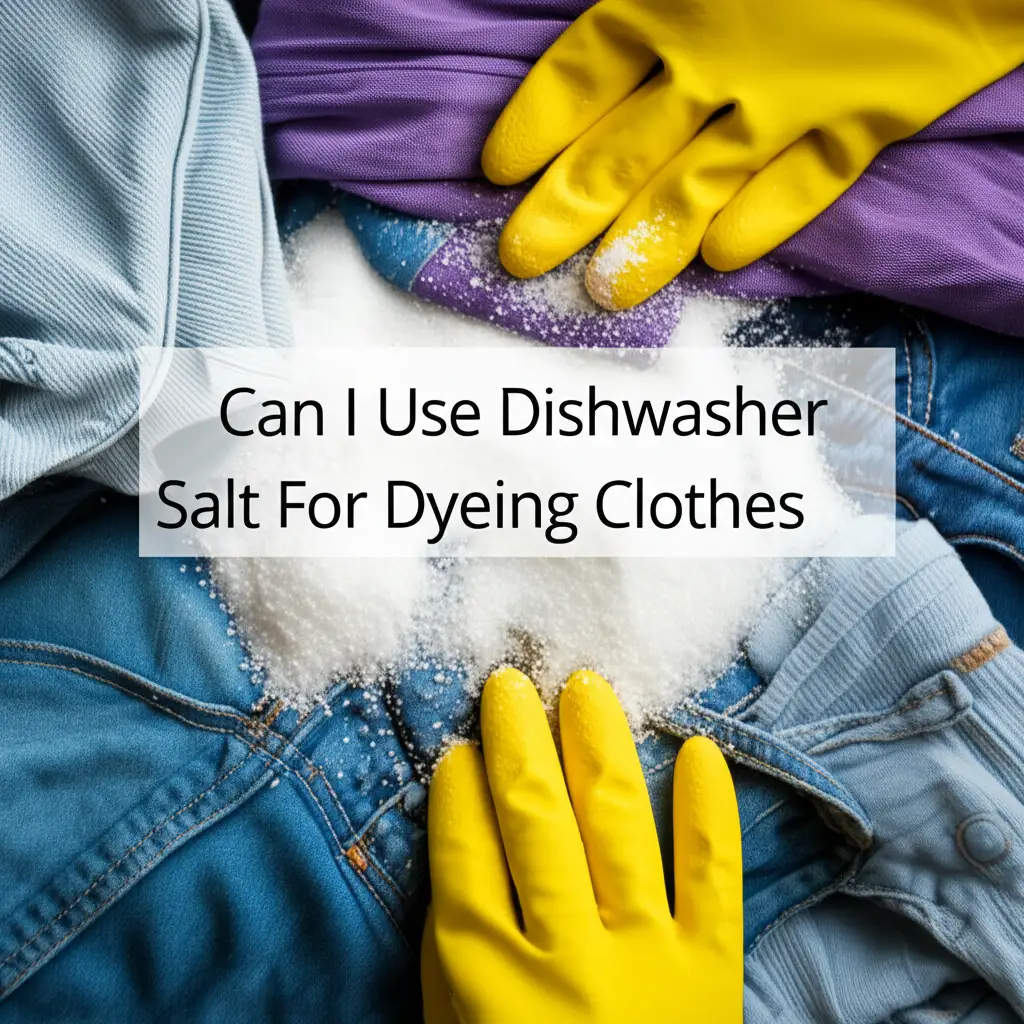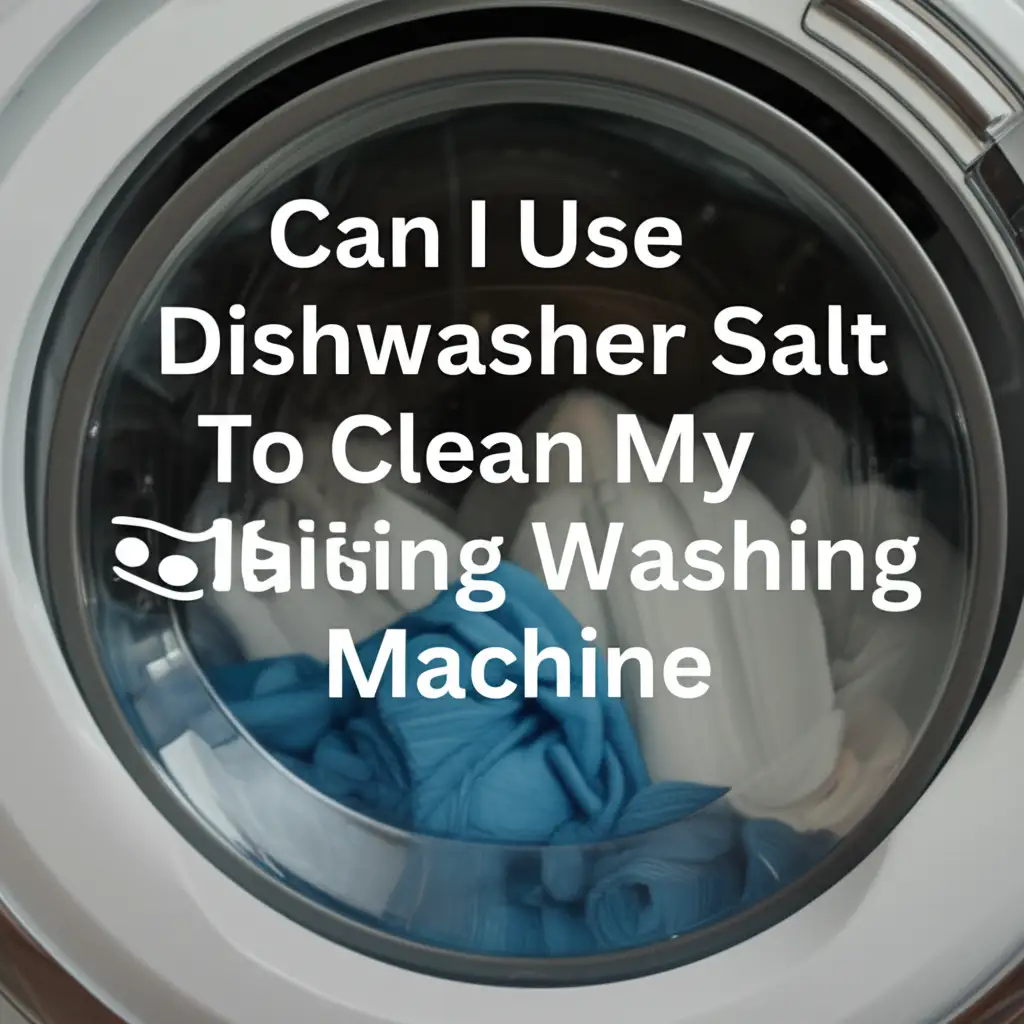· Davia Murnell · Home & Wellness · 20 min read
Can I Use Dishwasher Salt In The Bath

Can I Use Dishwasher Salt in the Bath?
Imagine sinking into a warm, soothing bath after a long day. You might reach for a favorite bath bomb or a scoop of relaxing Epsom salts. But what if you run out? A thought might pop into your head: “Can I use dishwasher salt in the bath?” It is a salt, after all. Many people consider household items for alternative uses. This question comes up often.
It is wise to question household product uses. We want to ensure safety and effectiveness. Dishwasher salt serves a specific purpose in an appliance. It helps improve water quality for dish cleaning. Its composition is different from salts made for bathing. We will explore the properties of dishwasher salt. We will also look at the potential effects on your body and home. This article will help you understand the risks. It will also guide you toward safe and effective bath salt alternatives. You can then make an informed choice for your next relaxing soak.
Takeaway
Using dishwasher salt in your bath is not a good idea.
- It can irritate your skin. Dishwasher salt is very pure sodium chloride. It lacks beneficial minerals found in bath salts.
- It does not provide therapeutic benefits. Unlike Epsom or Dead Sea salts, it does not offer muscle relaxation or skin soothing.
- It might harm your plumbing. High concentrations of industrial-grade salt can cause corrosion over time.
- It is not designed for human contact. Its purpose is to regenerate a water softener in an appliance.
- Always choose salts made for bathing. Epsom salt, Dead Sea salt, or Himalayan pink salt are safe options.
The Clear Answer
You should not use dishwasher salt in the bath. Dishwasher salt is high-purity sodium chloride. It is designed to regenerate a dishwasher’s water softener. It helps prevent limescale on dishes. This salt is not safe for skin contact. It lacks the beneficial minerals found in bath-specific salts. Using it could cause skin irritation or dryness. It will not provide a relaxing or therapeutic bath experience.
Understanding Dishwasher Salt: What Is It Really?
Many people wonder about the exact nature of dishwasher salt. This product is a specific type of salt. Its main purpose is to help your dishwasher work better. It does this by tackling hard water issues. Dishwasher salt is not like table salt or cooking salt. It is made for machine use, not for human consumption or bathing. Understanding its composition helps us see why it is not suitable for your bath.
Dishwasher salt is almost pure sodium chloride (NaCl). Manufacturers process it into large, slow-dissolving crystals. This high purity is important for appliance performance. It ensures no impurities clog the dishwasher’s internal systems. Regular table salt often contains anti-caking agents. It may also have iodine or other additives. These additives are fine for food. However, they can be problematic for dishwashers. They might leave residues on dishes. They could also interfere with the water softening process. Dishwasher salt is specifically designed to be free of these extra ingredients. This focus on purity makes it effective for its intended use. It is truly an industrial-grade product.
Sodium Chloride Purity for Appliances
Dishwasher salt is a very specific product. It contains almost 100% sodium chloride. This high purity is essential for its job in your dishwasher. It works to regenerate the ion-exchange resin. This resin softens the water inside the machine. Hard water has high mineral content. These minerals cause limescale. Limescale builds up on dishes and inside the dishwasher. This buildup makes dishes look spotty. It can also damage the appliance over time.
The purity of dishwasher salt prevents problems. Impurities found in other salts, like iodine or anti-caking agents, can cause issues. They might create foam. They could also leave cloudy marks on your glassware. For these reasons, dishwasher manufacturers recommend only using dedicated dishwasher salt. Using other types of salt can actually void your warranty. The specific size and hardness of the salt crystals also matter. They dissolve slowly and steadily. This process allows the water softener to work efficiently. You can learn more about how much dishwasher salt to use for optimal performance. How Much Dishwasher Salt Should I Put In and How to Know How Much Dishwasher Salt to Use offer further insights.
The Role of Dishwasher Salt in Water Softening
The main job of dishwasher salt is to soften the water. Many homes have hard water. Hard water contains high levels of dissolved minerals. Calcium and magnesium are common examples. These minerals cause problems in dishwashers. They leave behind white, chalky residue. This residue appears on dishes, glassware, and the inside of the machine. Over time, it can reduce the dishwasher’s efficiency. It can also shorten its lifespan.
Dishwasher salt addresses this issue directly. Modern dishwashers have a built-in water softener. This softener contains a resin. The resin attracts hard water minerals. Over time, the resin becomes saturated. It needs regeneration. This is where dishwasher salt comes in. When you add salt to the dishwasher’s salt compartment, it creates a brine solution. This brine flushes the resin. It pulls off the calcium and magnesium ions. The brine then drains away. This process restores the resin’s ability to soften water. This means your dishes come out cleaner and shinier. It also protects the appliance from limescale damage. For specific brand instructions, see How to Use Finish Salt for Dishwasher. If you’re curious about using it in other water softening systems, read Can I Use Dishwasher Salt in My Water Softener.
Why Dishwasher Salt Is Not for Your Skin: Potential Risks
Using dishwasher salt on your skin is a bad idea. This product is not made for human contact. Its high purity, while good for machines, makes it harsh for skin. Skin is a sensitive organ. It can react negatively to substances not meant for it. We need to protect our skin. Using proper bath products ensures this.
Dishwasher salt has no benefits for skin. It will not soothe muscles or improve skin texture. In fact, it can do the opposite. It is pure sodium chloride. This is essentially a very concentrated form of table salt. When dissolved in bath water, it creates a very saline environment. This high salt concentration can strip natural oils from your skin. This leads to dryness. It can also cause irritation, especially for sensitive skin types. There are much better and safer options for a beneficial bath.
Skin Sensitivity and Irritation
Our skin acts as a protective barrier. It keeps out harmful substances. It also holds in moisture. This barrier is delicate. It can react badly to harsh chemicals or high salt concentrations. Dishwasher salt falls into this category. It is industrial-grade sodium chloride. It is designed to interact with appliance parts and hard water minerals. It is not formulated for human skin.
Using dishwasher salt in a bath can lead to several skin issues. The high sodium chloride content can be very drying. It can strip away the skin’s natural protective oils. This leaves skin feeling tight, itchy, or rough. For people with sensitive skin, eczema, or psoriasis, the effects can be worse. It might cause redness, rashes, or burning sensations. It can even aggravate existing skin conditions. The large, coarse crystals of dishwasher salt are also not smooth. They might not dissolve quickly or completely. This could leave sharp particles in the water. These particles could scratch or irritate skin upon contact.
Drying Effects on Skin
One major concern with using dishwasher salt in the bath is its drying effect on the skin. Skin needs a balance of moisture to stay healthy and supple. Natural oils, called sebum, form a protective layer on our skin. This layer helps lock in hydration. When you expose your skin to highly concentrated salt solutions, like a bath with dishwasher salt, it can disrupt this balance.
The principle is simple osmosis. Water moves from an area of high concentration to an area of lower concentration. Our skin cells contain water. The highly saline bath water has a lower water concentration compared to our skin. This causes water to be drawn out of the skin cells. The result is dehydrated skin. This dehydration leads to a feeling of tightness. It can also make skin look dull. Over time, it can lead to flakiness and discomfort. Unlike specific bath salts which contain beneficial minerals that counter dryness or are used in lower, balanced concentrations, dishwasher salt offers no such counter-balance. Its sole purpose is highly effective demineralization of water. This effect, while good for appliances, is detrimental to skin moisture.
Beyond Skin: Impact on Your Plumbing and Bath Fixtures
When considering putting anything new down your drain, plumbing safety is a big concern. Dishwasher salt, while useful in its own machine, is not designed for direct plumbing exposure. Using it in your bath could cause issues with your home’s pipes and fixtures. This might lead to costly repairs down the line. We must think about the long-term impact of our choices.
Dishwasher salt dissolves in water. But its industrial purity and intended use raise questions. Regular use could contribute to corrosion of metal fixtures. It could also lead to buildup in pipes. The concentration of salt matters too. A bath uses a much larger volume of water than a dishwasher’s internal softening unit. This means a higher overall amount of salt being flushed down your drain. This higher concentration might speed up any negative effects. Always prioritize plumbing health. It keeps your home running smoothly.
Potential for Pipe Damage
The high purity and specific chemical nature of dishwasher salt can pose a risk to your home’s plumbing. Most plumbing systems use various materials. These include copper, PVC, and other metals. While these materials are robust, they are not impervious to all substances. Highly concentrated salt solutions, especially over time, can be corrosive. This means they can degrade metal pipes.
Sodium chloride is generally stable. But when dissolved in water, it can create a slightly acidic or alkaline solution depending on other factors. Repeated exposure to this type of environment can accelerate wear and tear on pipes. This is especially true for older plumbing systems. It could lead to leaks or weakened pipe joints. Unlike a dishwasher, which has a controlled environment for salt interaction, a bath sends the solution directly into your home’s drainage system. This system is not designed to handle high concentrations of industrial-grade salt on a regular basis. Prevention is always better than a costly repair.
Residue and Build-Up Concerns
Beyond corrosion, another plumbing concern is the potential for residue and build-up. While dishwasher salt is designed to dissolve completely in the dishwasher’s soft water system, its behavior in a bath might be different. The water in your bath might not be as hot or as agitated as inside a dishwasher. This could affect how well the salt dissolves. If the salt does not fully dissolve, it can leave behind crystalline residue.
This residue can then accumulate in your pipes. It can also stick to your bath fixtures. Over time, this buildup can narrow pipes. This restricts water flow. It can also create blockages. It makes cleaning your bath more difficult. The high concentration of sodium chloride can also interact with other substances in your drain. This includes soap scum or hair. This can create a harder, more resistant type of clog. Preventing such issues is important. It ensures your drains remain clear and functional. Always avoid introducing foreign substances into your plumbing unless they are explicitly designed for that purpose.
The Science of Bath Salts: What Makes Them Special?
Bath salts are a popular addition to a relaxing soak. But what makes them different from regular salt? The answer lies in their chemical composition. True bath salts are not just sodium chloride. They contain specific minerals that offer therapeutic benefits. This is a key difference from dishwasher salt. These minerals interact with your body in positive ways.
The most common types of bath salts are Epsom salt and Dead Sea salt. Both are rich in beneficial compounds. These compounds absorb through the skin. They can help with muscle aches, stress relief, and skin conditions. Understanding these differences helps us appreciate why specific bath salts are recommended. They are chosen for their positive effects on human health and well-being. Using the right salt means a better bath experience.
Magnesium Sulfate: The Soothing Element
When you hear “bath salts,” Epsom salt often comes to mind first. Epsom salt is not actually a salt in the traditional sense. It is magnesium sulfate. This compound has a unique chemical structure. It readily dissolves in water. When dissolved, it releases magnesium and sulfate ions. These ions are key to its therapeutic properties.
Magnesium is a vital mineral for the human body. Many people have a deficiency in magnesium. When absorbed through the skin, magnesium can help with muscle relaxation. It can ease cramps and soreness. This makes Epsom salt baths popular after exercise or for general aches. Sulfate also plays a role. It helps with detoxification pathways in the body. It helps flush out toxins. This combination of magnesium and sulfate makes Epsom salt highly effective for soothing muscles and reducing stress. It offers benefits that pure sodium chloride simply cannot. The way your body interacts with magnesium sulfate is very different from its interaction with pure sodium chloride.
Trace Minerals and Therapeutic Benefits
Beyond magnesium sulfate, other natural bath salts offer a wealth of trace minerals. Dead Sea salt is a prime example. It comes from the Dead Sea, a unique body of water. The Dead Sea has an extremely high mineral content. These minerals include magnesium, potassium, calcium, bromide, and sulfur. Each of these minerals contributes to therapeutic benefits.
Magnesium, as mentioned, aids muscle relaxation and stress reduction. Potassium helps regulate fluid balance and nerve signals. Calcium supports healthy bones and skin cell renewal. Bromide is known for its calming properties on the nervous system. Sulfur helps with skin conditions and detoxification. These trace minerals absorb through the skin during a bath. They can help nourish the skin. They can also reduce inflammation. Some people find relief from conditions like eczema or psoriasis. This rich mineral profile makes natural bath salts valuable for wellness. They offer a holistic approach to skin health and relaxation. Dishwasher salt lacks these diverse and beneficial components entirely.
Safe and Effective Alternatives for a Relaxing Bath
Since dishwasher salt is not suitable for your bath, what are your best options? Plenty of safe and effective alternatives exist. These products are specifically designed for bathing. They offer real benefits for your body and mind. Choosing the right bath additives enhances your experience. It also ensures your safety and well-being.
These alternatives range from readily available options to more specialized products. They can help soothe muscles, soften skin, and create a calming atmosphere. Always look for products marketed for bathing. Read the labels to understand their ingredients. This ensures you pick something that meets your needs. A good bath should be a treat, not a risk.
Epsom Salt: The Go-To Choice
Epsom salt is probably the most widely recognized and recommended bath salt. It is affordable and easy to find. You can buy it at most pharmacies, supermarkets, or online. Its popularity comes from its main ingredient: magnesium sulfate. This compound dissolves well in warm water. It releases magnesium and sulfate ions.
Using Epsom salt in your bath is simple. Add two cups of Epsom salt to a standard-sized bathtub filled with warm water. Swirl the water to help the salt dissolve. Then, soak for at least 20 minutes. The magnesium absorbs through your skin. It helps relax muscles and ease tension. Many athletes use Epsom salt baths for post-workout recovery. It also helps reduce stress and promotes better sleep. Epsom salt is generally safe for all skin types. It is a natural and effective way to enhance your bath.
Baking Soda for Skin Soothing
Baking soda, or sodium bicarbonate, is another excellent and safe alternative for your bath. It is a common household item. It is also known for its soothing properties. Baking soda helps balance the skin’s pH. This makes it particularly useful for irritated or itchy skin. It is gentle enough for most people, including those with sensitive skin.
To use baking soda in your bath, add about half a cup to a full tub of warm water. Stir the water to help it dissolve completely. Then, soak for 15-30 minutes. Baking soda can help relieve symptoms of sunburn, insect bites, or skin rashes. It can also make your skin feel softer and smoother. It does not offer the same muscle-relaxing benefits as Epsom salt. However, it is fantastic for skin comfort. It is a cost-effective and natural addition to your bathing routine.
Natural Additives for Aroma and Benefits
Beyond salts, many other natural additives can elevate your bath experience. These can add pleasant scents and extra therapeutic properties. You can combine them with Epsom salt or use them on their own. Essential oils are a popular choice. Just a few drops can transform the atmosphere. Lavender oil promotes relaxation. Peppermint oil can invigorate. Tea tree oil offers cleansing properties. Always dilute essential oils in a carrier oil (like jojoba or almond oil) or castile soap before adding to water. This prevents skin irritation.
Other natural options include oatmeal, milk, or herbs. Colloidal oatmeal baths are excellent for very dry or itchy skin. Milk baths can moisturize and soften skin due to lactic acid. Dried herbs like chamomile or calendula can add soothing properties and a natural aroma. You can place them in a muslin bag to steep in the water. Remember to use high-quality, pure ingredients. Always ensure they are safe for skin contact. These natural additions turn a simple bath into a spa-like retreat.
Making Informed Choices for Your Bathing Ritual
Choosing what goes into your bath is a personal decision. It impacts your well-being and the health of your home. Making informed choices means understanding what products are for. It means knowing their ingredients and potential effects. This approach helps you avoid mishaps and enjoy your bath safely.
Always read product labels carefully. This is important for anything you plan to use on your body. Look for ingredients that are safe for skin. Avoid industrial-grade products for personal care. Prioritize safety over convenience or cost. Your skin and plumbing will thank you. A relaxing bath should be a worry-free experience.
Prioritizing Safety in Bath Products
Safety must be the top priority when choosing bath products. Our skin is highly absorbent. What we put on it can enter our bloodstream. This is why using products specifically formulated for bathing is crucial. These products undergo testing. They ensure they are safe for skin contact. They do not contain harsh chemicals or irritants.
Dishwasher salt is a prime example of a product not intended for human use. Its manufacturing process does not consider skin sensitivity. It aims for appliance efficiency. Always opt for bath salts or other bath additives clearly labeled for personal care. Look for reputable brands. Check for certifications if you have specific skin concerns. If you are unsure about an ingredient, research it. Consulting a dermatologist is a good step if you have very sensitive skin or pre-existing conditions. Do not take risks with your health or safety.
Understanding Product Labels and Ingredients
Reading product labels is a powerful tool for making smart choices. Labels provide important information about what is inside a package. When it comes to bath products, pay close attention to the ingredients list. Ingredients are usually listed in order of quantity, from most to least. This helps you identify the main components.
For bath salts, look for ingredients like magnesium sulfate (Epsom salt), sodium chloride (if it is a sea salt), or specific mineral names. Avoid products with vague terms like “industrial salt” or those not explicitly for bathing. Check for any warnings or usage instructions. Some bath products might have specific concentrations or usage limits. Understanding these details helps you use the product correctly and safely. A well-informed consumer makes the best decisions for their health and home.
FAQ Section
Can dishwasher salt hurt my skin?
Yes, dishwasher salt can harm your skin. It is pure sodium chloride, an industrial-grade product. This concentration can strip natural oils from your skin, leading to dryness and irritation. It lacks the beneficial minerals found in bath salts that soothe skin. It is not designed for direct skin contact or human use.
What is the difference between dishwasher salt and Epsom salt?
Dishwasher salt is high-purity sodium chloride. Its job is to regenerate a dishwasher’s water softener. Epsom salt is magnesium sulfate. It is used for therapeutic baths. Epsom salt provides magnesium, which absorbs through the skin to relax muscles and reduce stress. They have different chemical compositions and purposes.
Can I use table salt in my bath instead?
While table salt is also sodium chloride, it contains additives like iodine or anti-caking agents. These might not be harmful but offer no special benefits in a bath. Table salt is not ideal compared to dedicated bath salts like Epsom or Dead Sea salt. These provide minerals that offer therapeutic effects.
What happens if I accidentally put dishwasher salt in my bath?
If you accidentally put a small amount of dishwasher salt in your bath, drain the water. Rinse the tub thoroughly. A one-time, small exposure is unlikely to cause severe issues. However, avoid skin contact and do not soak in the water. Prolonged exposure or large amounts can cause skin irritation.
What are the best alternatives for a relaxing bath?
The best alternatives for a relaxing bath include Epsom salt, Dead Sea salt, and Himalayan pink salt. These salts offer therapeutic minerals that soothe muscles and nourish skin. You can also add natural ingredients like baking soda for skin soothing or essential oils for aromatherapy benefits.
Will dishwasher salt damage my bathtub or pipes?
Regular or large-scale use of dishwasher salt in your bath could potentially damage your bathtub or pipes over time. The high concentration of sodium chloride can be corrosive to metal fixtures. It might also lead to residue buildup in pipes. This could cause blockages or accelerate wear and tear on your plumbing system.
Conclusion
The thought of using dishwasher salt in your bath might seem like a clever hack, especially if you are out of traditional bath salts. However, as we have explored, this is not a good idea. Dishwasher salt is a highly specific product. It is pure sodium chloride made for appliances. It is designed to tackle hard water in your dishwasher. It is not for your skin or plumbing.
Using dishwasher salt in the bath carries real risks. It can cause skin irritation and excessive dryness. It strips your skin’s natural moisture barrier. It also offers no therapeutic benefits. Furthermore, regular use could potentially harm your home’s plumbing and bath fixtures. It may lead to corrosion or residue buildup. Always choose products designed for their intended purpose.
Instead, opt for safe and effective alternatives like Epsom salt or Dead Sea salt. These products contain beneficial minerals such as magnesium sulfate. They truly enhance your bathing experience. They help relax muscles, soothe skin, and reduce stress. Always prioritize your health and safety. Make informed choices about what goes into your personal care routine. Your skin and your home will be better for it. Create a truly beneficial and relaxing bathing ritual by choosing the right products.





